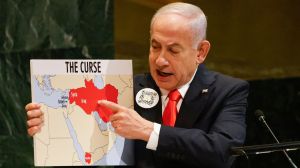For the love of Saddam
February 27: Ahmed Yassem woke his wife, mother and child before dawn and piled them into a taxi for a three-hour journey to Baghdad, paying...

February 27: Ahmed Yassem woke his wife, mother and child before dawn and piled them into a taxi for a three-hour journey to Baghdad, paying the equivalent of four months’ wages so that they could spend the day at the Sheikh Abdul Kader Mosque to thank Allah for sending Kofi Annan to Iraq.During the UN secretary-general’s visit, Baghdad mosques were filled with pious, desparate Iraqis thanking God for offering the prospect of peace and praying for end to sanctions.
Yassem, a school teacher from Amara, said: “Allah is the only one who can lift sanctions. We trust in Allah and in President Saddam Hussein to solve our problems.” Allah and President Saddam are frequently mentioned in the same breath these days. Mosque attendants wear Saddam badges on their robes, and huge portraits of the Iraqi leader praying are found at every turn, setting an example to clerics and the faithful.
On an abandoned, bomb-scarred airfield on the other side of Baghdad, work has started on what is supposed to be the world’slargest mosque, with room for 45,000 worshippers. The mosque, to be named after President Saddam, will rise from a huge artificial lake in the shape of the Arab world.
Under the relentless pressure of two decades of wars and sanctions, Iraq is being transformed down to its foundations from one of the most secular nations in the Middle East to an increasingly devout society.
Almost every successive crisis has brought a corresponding lurch towards religion, as the government has struggled to counteract domestic unpopularity and regional isolation. During the Gulf war the inscription Allah u Akbar (God is Great) was added to the national flag. Two years later, alcohol was banned. In the past 10 years the abaya (veil) has become a common sight on Iraq’s formerly fashion-conscious women.
A European diplomat in Baghdad believes the embrace of Islam has so far paid political dividends, but represents a high-risk strategy. “It gives Saddam a direct line to the hearts and minds of millions of Iraqis in themosques. They are never without Saddam. But religion is a very dangerous tiger to ride,” the diplomat said.
The emphasis on religion also underlines the narrow base of the regime’s support. President Saddam and his clan from the Tikrit region are Sunni Muslims, as have been all Iraqi leaders since the 16th century, but more than 65 per cent of the country’s 20 million people are Shi’ites. The divide is masked and hotly denied, but it broke to the surface with bloody consequences after the Gulf war. The southern Shi’ites revolted at the same time as the northern Kurds and took their revenge on prominent Sunni officials for centuries of second-class citizenship. The regime responded by slaughtering thousands of Shi’ites and levelling villages and mosques to reassert control.
The greatest fear of some Sunnis in Baghdad last week was that US and British bombing would unleash a new Shi’ite revolt. “I know people who are collecting arms in their houses to protect themselves, not against the Americans whocan’t be touched, but against the Shi’ites,” one Sunni said.On a working morning the huge blue and gold mosque was packed. Sayeed Abbas Hadi, the curator of the 500-year-old mosque, bristled at the suggestion that the Shi’ite branch of Iraqi Islam was, perhaps, growing faster than its Sunni counterpart. “America and Britain tried to split Iraq during the Gulf war. But they will not be divided. They have a great deal of love in their hearts for Saddam Hussein,” he said.
In the courtyard outside the government-appointed cleric’s reception room, the guardians of that love were everywhere — young men in incongruously fashionable dark clothes stood among the milling crowd, dispersing small groups of worshippers. There are carrots also for the Shi’ites. Sayeed Abbas Hadi said: “All sponsorship comes from the government, especially from President Saddam Hussein. He is as you are aware one of the descendants of Ali.”
Ali, the Prophet Mohammed’s cousin and son-in-law, is revered by the Shi’ites. That anorthern Sunni leading an avowedly secular party should have discovered such a direct link appeared to be a perfectly understandable coincidence to the venerable holy man.
The Guardian News Service





- 01
- 02
- 03
- 04
- 05


























